Rehabilitation Therapist
Entry Level Qualification
12
Career Fields
Medical Services
For Specially Abled



About Career
Rehabilitation Therapists are specialised healthcare professionals who help people restore normal day to day physical functionalities, mental abilities, and working life after a debilitating illness, accidental injuries, surgical operation, imprisonment, or addiction. They also help people with disabilities develop physical and mental abilities to lead a normal, healthy and working life.
A Rehabilitation Therapist improves day to day abilities that could be physical, mental or cognitive which an individual might have lost due to an injury or a disease Some of the causes are trauma, injury, stroke, critical surgery, developmental disorders, severe neck or back pain, and so on.
Key Roles and Responsibilities
As a Rehabilitation Therapist, you would be engaged in one or more of the following roles and responsibilities:
1. You will carry out a basic assessment of persons with a disability in order to identify individual priorities, the main rehabilitation problems and the needs for rehabilitation.
2. You will provide appropriate mental health interventions designed to help clients develop skills that will enable them to reach recovery as indicated the treatment plans
3. You will work collaboratively with the clinical team to engage, educate, communicate, and coordinate care with member, their family, behavioral health, medical health providers, community resources and others in ensuring that all services prescribed in the individualized service plan are implemented
4. You will collaborate with the person and his/her family or significant others to implement an effective service plan, explaining the available clinical options to the team, including the advantages and disadvantages of each option.
5. You will provide continuous evaluation of the effectiveness of treatment through the ongoing assessment of the person and input from the person and relevant others resulting in modification to the service plan as necessary.
6. You will provide assisting services for person with mental illness including continuing education, employment, independent housing and community tenure.
7. You will be involved in assessing, documenting and providing the appropriate level of support and skill needed to assist the member to maintain or achieve their living, learning, social, leisure goals.
8. You will design and implement individualized treatment plans based on behaviour modification principles for all assigned clients as well as maintain client reports and documentations.
9. You will also implement behaviour modification interventions with assigned clients to address impaired psychological functioning. Interventions will address issues pertaining to behaviour management, social competency, problem identification and resolution, effective communication, moral reasoning, identity and emotional intimacy, self-sufficiency, life goals and so on.
10. You will communicate recommendations for service referrals to direct supervisor and to client’s therapist or psychiatrist to verify referral is in alignment with course of treatment.
11. You will develop an Integrated Treatment Team Plan (ITTP) and facilitate implementation of the individual program goals. Goals can include community living skills, daily living skills, interpersonal skills, vocational/educational skills, medication management, physical health care, mental health services, substance abuse services, psychiatric emergency/ relapse
12. You will advise in areas where a hearing impairment may be causing personal difficulties, giving practical advice, talking through the psychological effects of hearing loss and helping people to adapt and adjust their routines. You will also assess the oral-motor skills (movement of face muscles like jaw, mouth, tongue etc.) and perform speech-language assessments
13. You will promote, support and implement rehabilitation activities at the community level and facility referrals to access more specialised rehabilitation services
14. You will be involved in the rehabilitation of disable by providing ADL training (Activities of Daily Living), mobility, social, psychological, and behavioural counselling, occupational counselling and assessing the progress made by the individual and effectiveness of community disability prevention and rehabilitation services.
PARTICULARS | DESCRIPTION |
Name | Rehabilitation Therapist |
Purpose | Assist in Recovery |
Career Field | Allied & Para Medical Science |
Required Entrance Exam | NEET UG, NEET PG |
Average Salary | 1,00,000 - 3,00,000 Rs. Per Year |
Companies For You | Medanta, ReLiva Rehabilitation Hospitals & Many More |
Who is Eligible | Class 12th Pass |
Career Entry Pathway
Class 10 all subjects as per scheme of studies– Class 11-12 Physics, Chemistry and Biology along with any other subject as per scheme of studies - Bachelor of Rehabilitation Science – Get registered with the Rehabilitation Council of India (RCI) - Become a Rehabilitation Therapist.
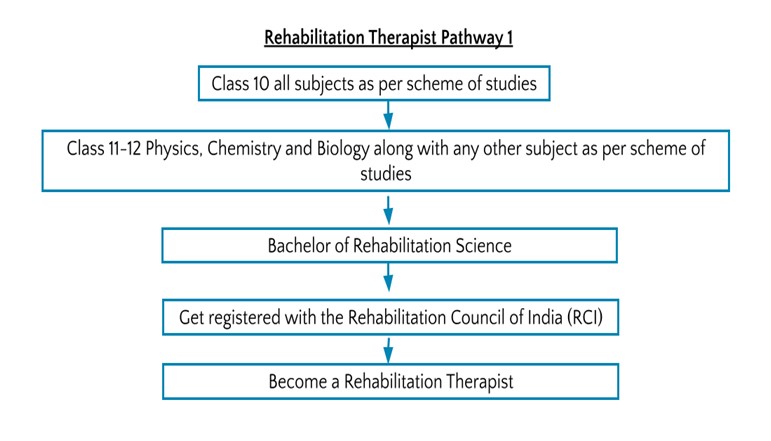
After completing Class 11-12 Physics, Chemistry and Biology along with any other subject as per scheme of studies you can go for Bachelor of Rehabilitation Science. After completing graduation in Rehabilitation Science, you need to get registered with the Rehabilitation Council of India (RCI) to become Rehabilitation Therapist.
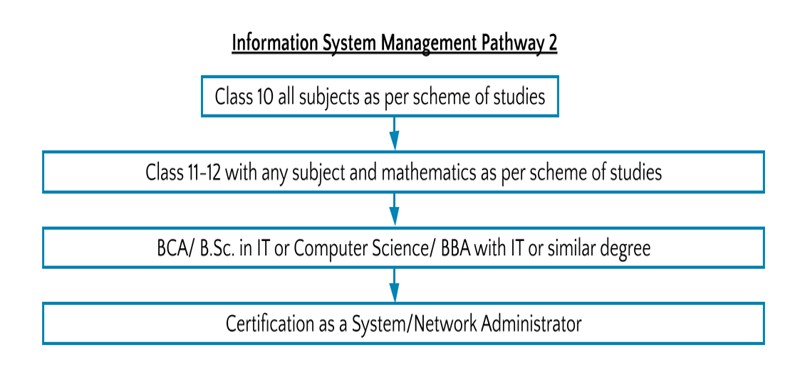
After completing Class 11-12 Physics, Chemistry and Biology along with any other subject as per scheme of studies you can go for Bachelor of Rehabilitation Science. After graduation you can go for master’s degree in Rehabilitation Science (M.R.Sc.) and then get registered with the Rehabilitation Council of India (RCI).
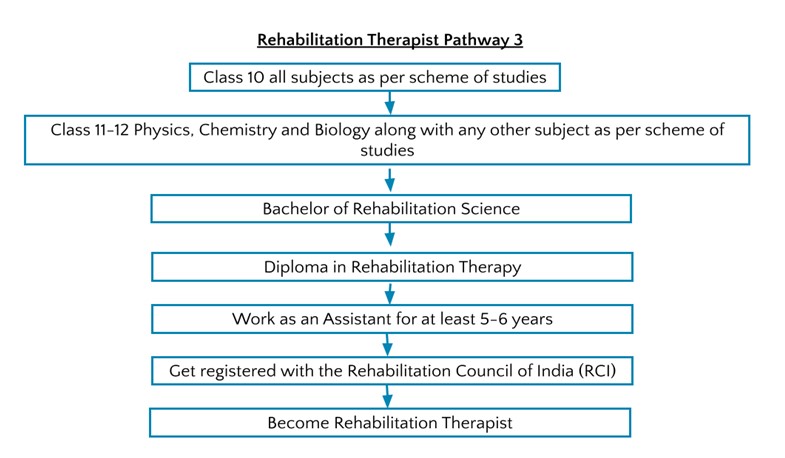
After completing Class 11-12 Physics, Chemistry and Biology along with any other subject as per scheme of studies - Bachelor of Rehabilitation Science you can go for a Diploma in Rehabilitation Therapy. After diploma you need to work for at least 5-6 years and then obtain a Bachelor’s degree in Rehabilitation Therapy. Then get registered with the Rehabilitation Council of India (RCI).
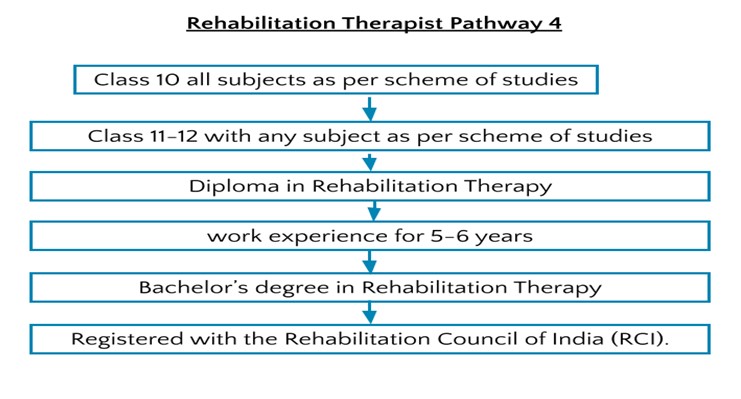
After completing Class 11-12 Physics, Chemistry and Biology along with any other subject as per scheme of studies you can go for Bachelors in any branch of Psychology. After graduation you need to pursue Post Graduate Diploma in Rehabilitation Psychology in order to work as Rehabilitation Psychologist.
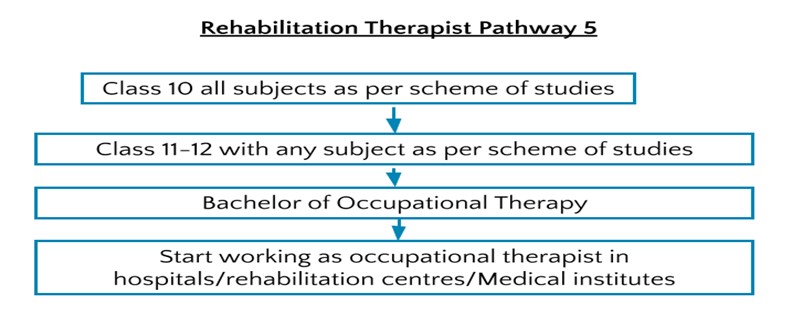
After completing cClass 11-12 with any subject as per scheme of studies, you can go for Bachelor of Occupational Therapy and start working as occupational therapist in hospitals/rehabilitation centres/Medical institutes.
Required Qualification & Competencies
1. After completing higher secondary studies, you can go for B.Sc. in Rehabilitation Therapy. You need to work for a few years in order to become a Rehabilitation Therapist.
2. After completing higher secondary studies, you can go for Bachelor of Rehabilitation Science. After graduation you can go for master’s degree in Rehabilitation Science (M.R.Sc.) and then get registered with the Rehabilitation Council of India (RCI).
3. After completing higher secondary studies, you can go for a Diploma in Rehabilitation Therapy. After diploma you need to work for at least 5-6 years and then obtain a Bachelor’s degree in Rehabilitation Therapy. Then get registered with the Rehabilitation Council of India (RCI).
4. After completing higher secondary studies, you can go for Bachelors in any branch of Psychology. After graduation you need to pursue Post Graduate Diploma in Rehabilitation Psychology in order to work as Rehabilitation Psychologist.
5. After completing higher secondary studies, you can go for Bachelor in Audiology and Speech-Language Pathology (B. ASLP) and get registered with RCI to start working as rehabilitation professional
6. After completing higher secondary studies, you can go for Bachelor in Prosthetics and Orthotics (B.P.O.)/ Occupational Therapy/ Physiotherapy or similar. You can get yourself registered with RCI and start working as a certified professional in your field.
7. After completing higher secondary studies, you can go for a Diploma in Community Based Rehabilitation and get registered with RCI to start working as a certified rehabilitation professional.
MINIMUM EDUCATION REQUIRED | MAXIMUM EDUCATION REQUIRED |
Under Graduate Undergraduate Degree / Honours Diploma / Graduate Diploma (equivalent to a Degree) Programs for which the minimum eligibility is a pass in Higher Secondary / Class XII School Leaving examination. | Post Graduate Postgraduate Degree / Diploma / Certificate Programs for which the minimum eligibility is a pass in Graduation / equivalent Diploma program like Honours Diploma or Graduate Diploma. |

Competencies Required
Interest
1. Enterprising: You should have interests for Enterprising Occupations. Enterprising occupations involve taking initiatives, initiating actions, and planning to achieve goals, often business goals. These involve gathering resources and leading people to get things done. These require decision making, risk taking and action orientation.
2. Realistic: You should have interests for Realistic Occupations. Realistic occupations involve more practical and hands-on activities than paperwork or office work. Realistic occupations often involve physical activities for getting things done using various tools and equipment.
3. Conventional: You should have interests for Conventional Occupations. Conventional occupations involve repetitive and routine tasks as well as fixed processes or procedures for getting things done. These occupations involve working more with data, systems, and procedures and less with ideas or creativity.
Knowledge
1. Healthcare Services: Knowledge of different fields which are related to offering various types of healthcare services to people; assisting physicians and surgeons to carry out diagnosis, treatment and prevention of human diseases, ailment and disorders. This includes knowledge of different practices apart from medicine which are used to treat and prevent human diseases or to provide holistic healthcare and wellness. This also includes knowledge about drugs and medicines.
2. Personal Care Service: Knowledge of how to provide various assistance and services to others. This includes looking after the needs of individuals, understanding what they need and provide all assistance at home or elsewhere.
Skills
1. Active Listening: Giving full attention to what other people are saying, understanding the points being made by others, asking questions, etc.
2. Coordination: Skills in working together with other people to get things done.
3. Critical Thinking: Skills in analysis of complex situations, using of logic and reasoning to understand the situations and take appropriate actions or make interpretations and inferences.
4. Judgment and Decision Making: Skills in considering pros and cons of various decision alternatives; considering costs and benefits; taking appropriate and suitable decisions.
5. Problem Solving: Skills in analysis and understanding of problems, evaluating various options to solve the problems and using the best option to solve the problems.
Abilities
1. Deductive Reasoning: The ability to apply general rules and common logic to specific problems to produce answers that are logical and make sense. For example, understanding the reasons behind an event or a situation using general rules and common logic
2. Inductive Reasoning: The ability to combine pieces of information from various sources, concepts, and theories to form general rules or conclusions. For example, analysing various events or situations to come out with a set of rules or conclusions
3. Inter-Personal: The ability to build and maintain good relationships with others at workplaces and elsewhere.
4. Problem Sensitivity: The ability to tell when something is wrong or is likely to go wrong. It does not involve solving the problem, only recognizing there is a problem.
Personality
1. You are always or mostly organized in your day-to-day life and activities.
2. You remain calm in emergencies and work well under pressure.
3. You always feel secure in your surroundings and in most situations.
4. You are a soft-hearted person sometimes.
5. You trust others sometimes but not always.
6. You act independently sometimes but do not do so in some other times.
7. You are always practical or in most situations.
Career - Job Opportunities & Profiles
As a Rehabilitation Therapist, you may find work in:
1. Rehabilitation Centres such as ApoKOS, ProHealth Asia Physiotherapy & Rehab centre, NewRo, Aviss Health, etc. and hospitals (which provide rehabilitation facilities) such as Fortis Escorts Heart Institute, Columbia Asia Hospitals, Gleneagles Global Hospital etc.
2. Special schools like Alpha to Omega Learning Centre, Nalanda Institute for Learning Disabilities, Autism connect, MITHRA, Sankalp, etc.
3. NGOs like Sangath, Samarthan Trust, Udaan, Astha, Tamana, etc.
4. National Institutes/National Level Rehabilitation Institutes such as All India Institute of Physical Medicine and Rehabilitation (AIIPMR), Pt. Deendayal Upadhyaya National Institute For Persons with Physical Disabilities (IPH), National Institute of Occupational Health (NIOH), National Institute of Rehabilitation Training and Research (NIRTAR), etc.
Specialisation Tracks In This Career
1. Rehabilitation Therapist (Neuro-rehabilitation)
Neurological Rehabilitation Therapists assist in providing therapies to individuals (suffering stroke, brain or spine injury, etc.) to regain mobility, build strength and resume daily activities. The neurological rehabilitation comprises of all rehabilitative therapies for restoring the neurological health of the individual.
2. Rehabilitation Therapist (Paediatrics)
Paediatric Rehabilitation Therapists assist in providing therapies to infants (having developmental delays, attention deficiency hyperactivity disorder, autism spectrum disorders, etc.) to regain, enhance or improve child’s playfulness, boosting confidence and gaining overall strength.
3. Rehabilitation Therapist (Musculoskeletal & Orthopaedic)
Musculoskeletal & Orthopaedic Rehabilitation Therapists assist in providing treatment and care to the people with impairments, disabilities or deformities due to diseases, disorder, injury caused to the muscles, ligaments or bones.
4. Rehabilitation Therapist (Cardiovascular & Respiratory)
Cardiac Rehabilitation therapists deal with optimizing physical function in patients with cardiac diseases, cardio pulmonary surgeries, bypass etc. Therapist’s helps patients in restoring and maintaining optimal health post surgeries while preventing the risk of future heart problems. Respiratory Rehabilitation or Lung Rehabilitation therapists are involved in providing lung care for patients with progressive and ongoing lung disease (COPD, asthma, bronchiectasis, etc.)
5. Rehabilitation Psychologist
Rehabilitation psychologists study and work with individuals having with physical disabilities, psychological trauma, brain injury or chronic illnesses. These disabilities or illnesses could cause emotional problems, cognitive, developmental disorders, addiction or chronic pain etc. Rehabilitation psychologists focus on assessing and identifying the individuals’ problems and recommending a course of treatment.
Career Growth
1. After a Diploma in Rehabilitation Therapy you would start as an Assistant i.e. Rehabilitation Therapy Assistant. In order to become a professional Therapist, you would have to pursue higher qualifications and get registered with Rehabilitation Council of India (RCI).
2. After completing bachelors or equivalent degree from the Rehabilitation Council of India (RCI) and getting certified by the RCI, you will start directly as a Rehabilitation Therapist.
Salary Offered
1. At Entry level, you may earn around Rs. 8,000 to Rs.15,000 per month.
2. At Junior-level with an experience of 1- 4 years you may earn around Rs. 10,000 – 20,000 per month.
3. At Mid-level with an experience of 5-12 years you may earn around Rs. 20,000 – 40,000 per month.
4. At Senior-level with an experience of 12-20 years you may earn around Rs. 30,000 – 70,000 per month.
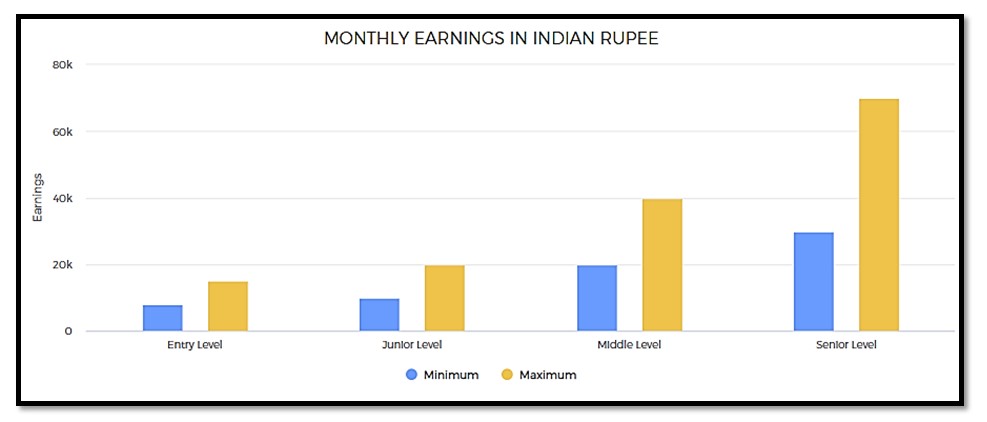
Monthly Earnings In Indian Rupee
Entry Level | Junior Level | Mid Level | Senior Level | ||||
Min Earning | Max Earning | Min Earning | Max Earning | Min Earning | Max Earning | Min Earning | Max Earning |
8000 | 15000 | 10000 | 20000 | 20000 | 40000 | 30000 | 70000 |
1. Entry level: 0 - 2 years of work experience
2. Junior Level: From 1 to 12 years of work experience
3. Mid Level: From 5 to 20+ years of work experience
4. Senior Level: From 10 to 25+ years of work experience (there could be exceptions in some high-end technical, financial, engineering, creative, management, sports, and other careers; also in the near future, people will reach these levels much faster in many careers and in some careers, these levels will have no meaning as those careers will be completely tech skill driven such as even now, there is almost no level in a Cyber Security Expert’s job)
Work Activities
1. Assisting and caring for people: Assisting people in availing of services; taking care of people in different situations; offering help and services to others.
2. Providing advices and consultation to others: Giving advices or consultation to others about various issues, conceptual matters, know-hows, scientific matters, products or services.
3. Analysing and interpreting data and information: Analysis of data and information to find facts, trends, reasons behind situations, etc.; interpretation of data to aid in decision making.
4. Communicating with co-workers and others: Communicating with people in writing, verbally or otherwise inside your workplace and various other people who have professional relationships with your place of work including vendors, government officials, etc. or with people at large
5. Decision making and problem solving: Analysis of data and information; evaluation of alternative decisions and results of decisions; taking the right decisions and solving problems.
6. Developing and maintaining inter-personal relationships: Developing professional relationships with co-workers and others outside organisations and maintaining good relationships.
7. Inspecting equipment, systems, structures, and materials: Inspecting equipment, systems, structures, and materials to ascertain quality, performance, defects, causes of errors, etc.
8. Inspecting situations, events, and people: Inspecting situations, events and people to understand the reasons and causes for the situation or events to happen; inspecting people to understand reasons behind their behaviour and actions.
9. Updating and using relevant knowledge: Keeping updated with the latest knowledge relevant to your fields of work and use of the relevant knowledge in getting things done.
10. Using computers for work: Using computers for day-to-day office work; using computer software for various applications in day-to-day professional work; entering data and process information; for writing.
11. Working in a team: Working in a team of people; developing team; maintaining professional relationships among team members.
Future Prospects
1. According to the National Statistical Office (NSO) survey report, of the total population in India around 2.2% population is suffering from disability. According to the NSSO survey, 25% of disabilities are due to motor vehicle injuries of which 9.2% is visual, 12.5% is hearing related, 16.8% relates to speech deficits, and 27% is loco-motor.
2. Moreover, 48% of severe head injury patients, 45% moderate head injury patients and 47% mild head injury patients were found to have disability which needed rehabilitation services. These injuries could be cured by quick recovery which can be promoted via rehabilitation services like physiotherapy, speech therapy, neuro-feedback, etc.
3. The data established through these reports indicate a growing demand for rehabilitation services in India. Therefore a career in Rehabilitation Therapy is expected to be in high demand in the upcoming years.
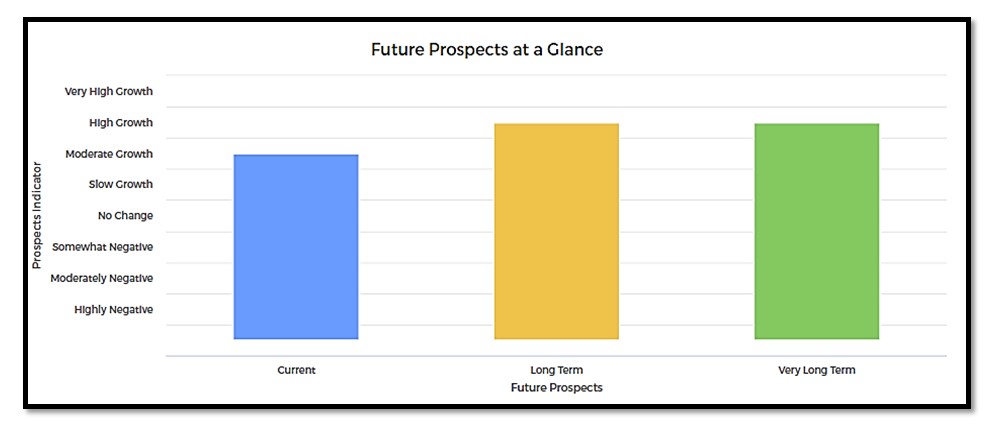
Future Prospects At A Glance
Current (0-1 year) | Long Term (2-5 year) | Very Long Term (6-10 years) |
Moderate Growth | High Growth | High Growth |


